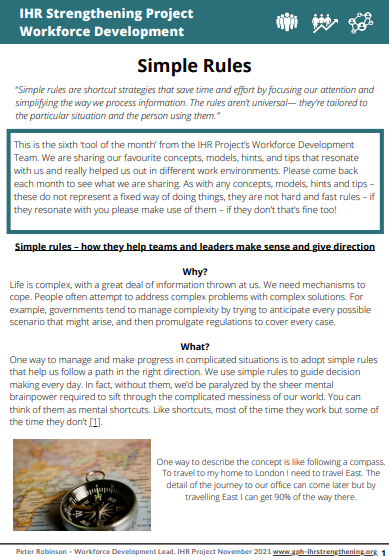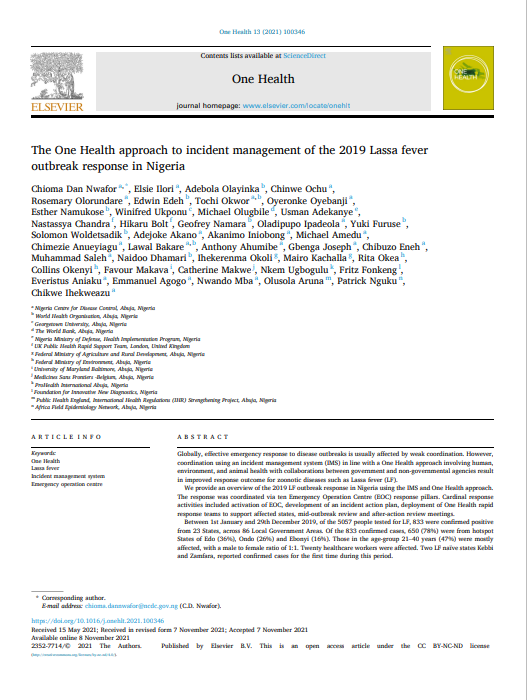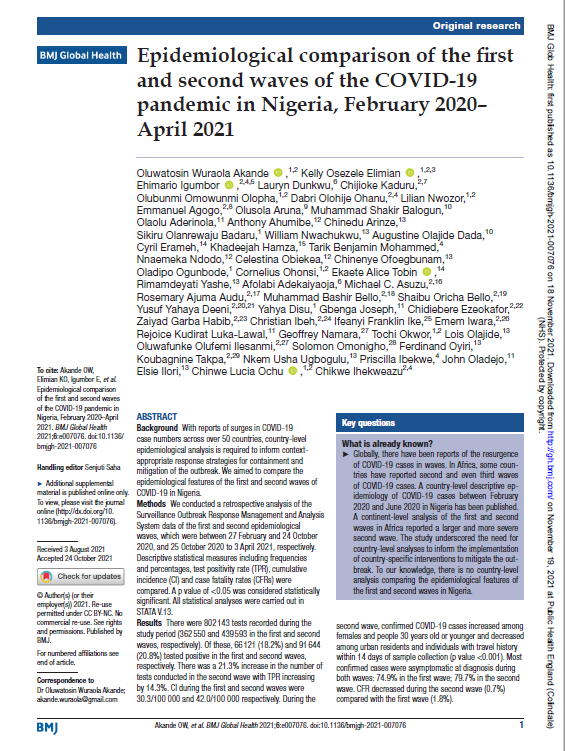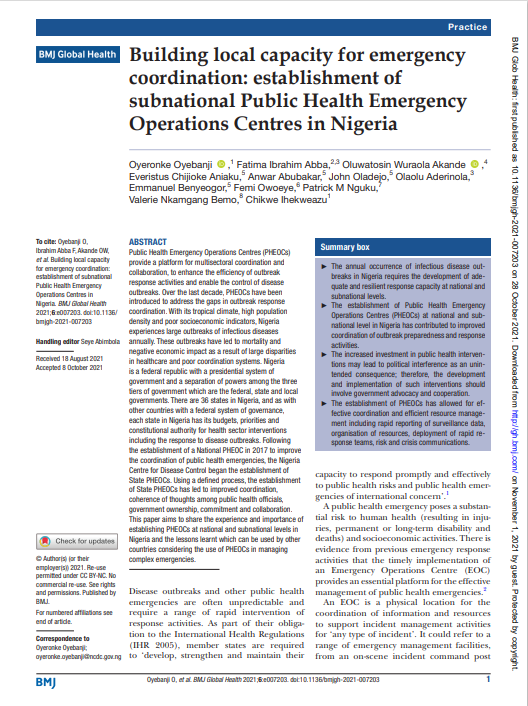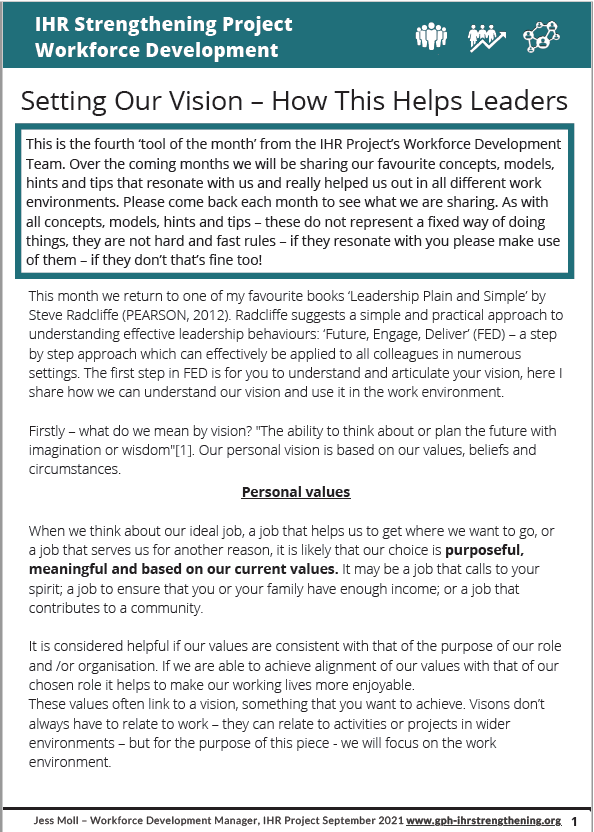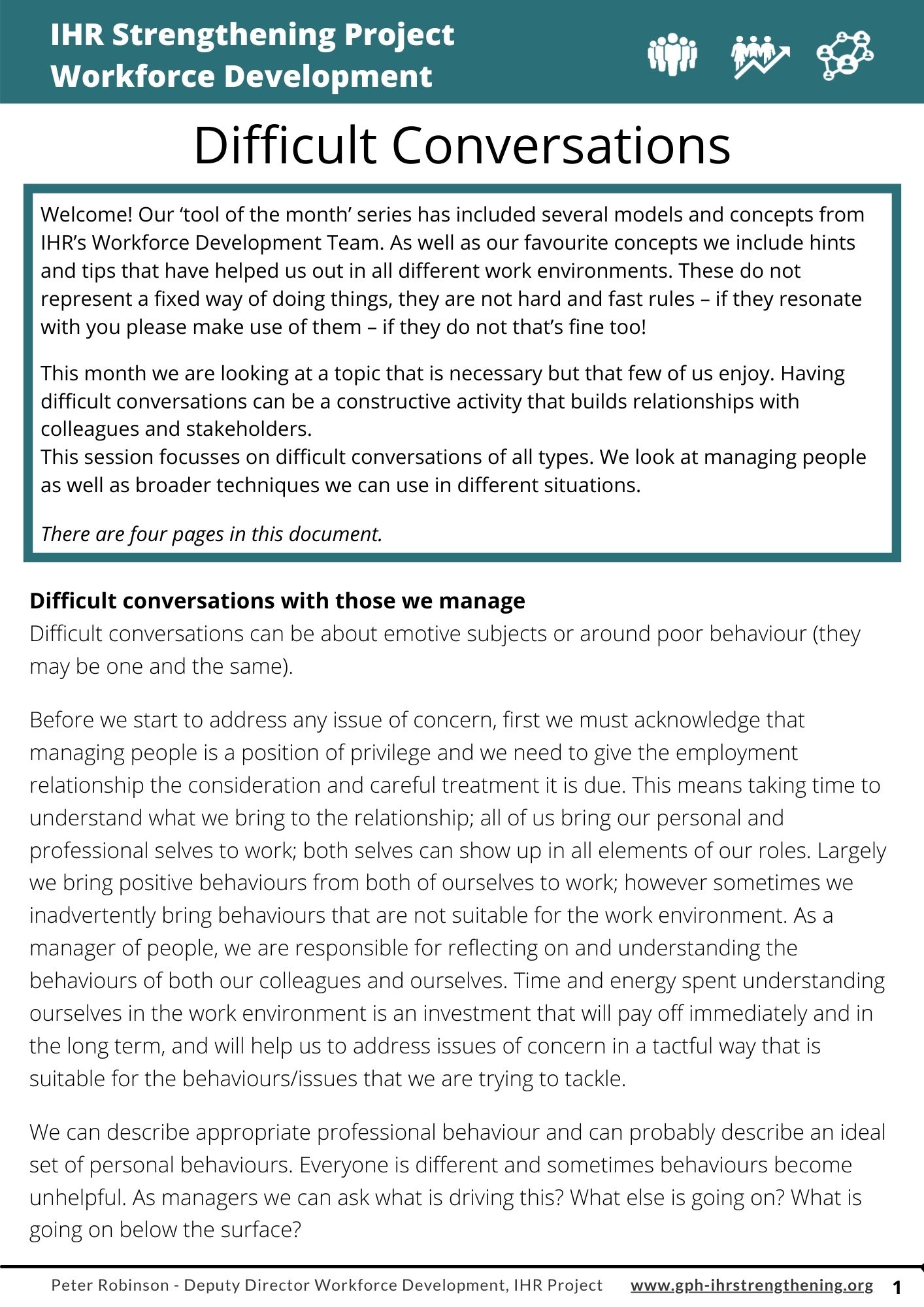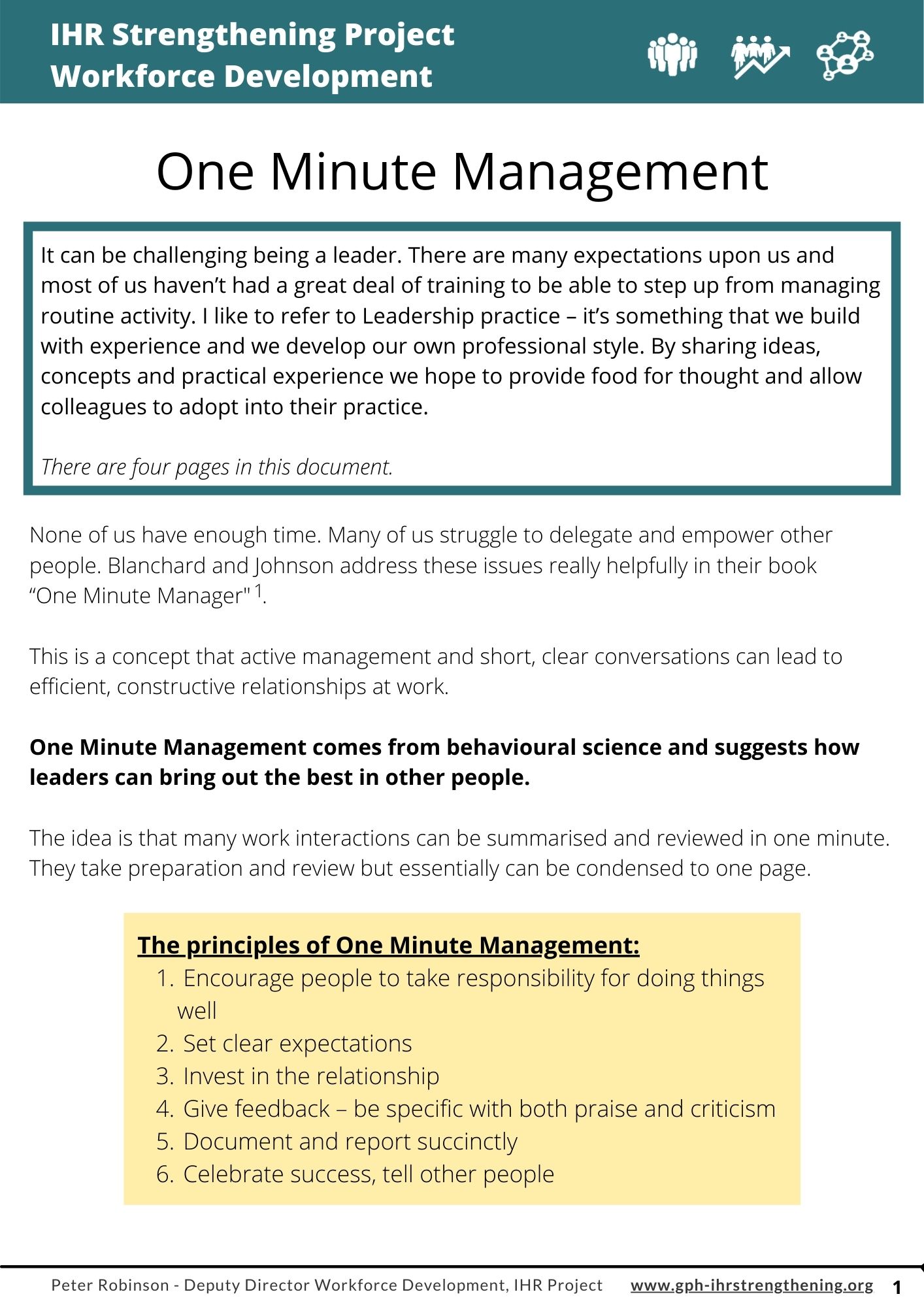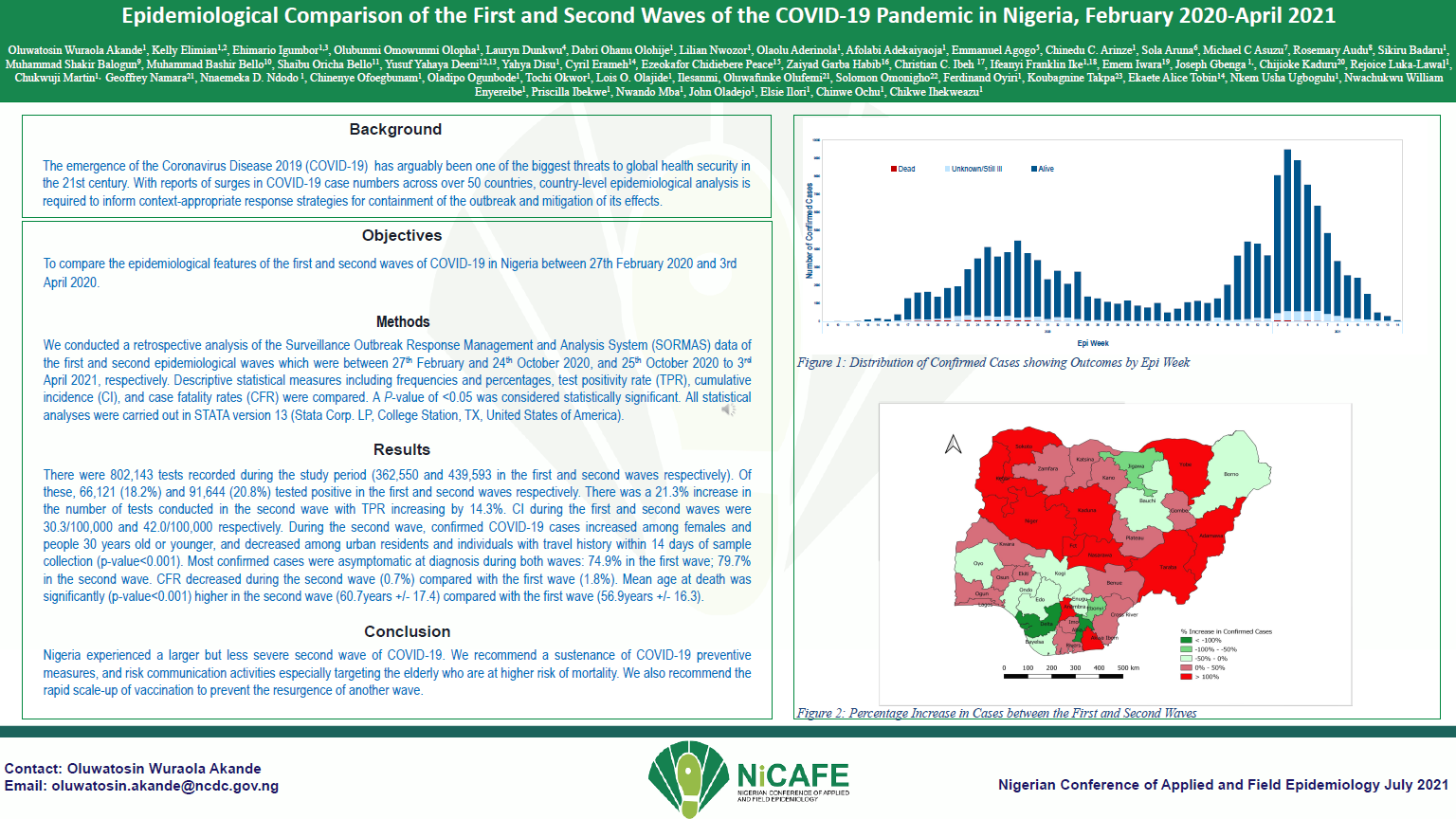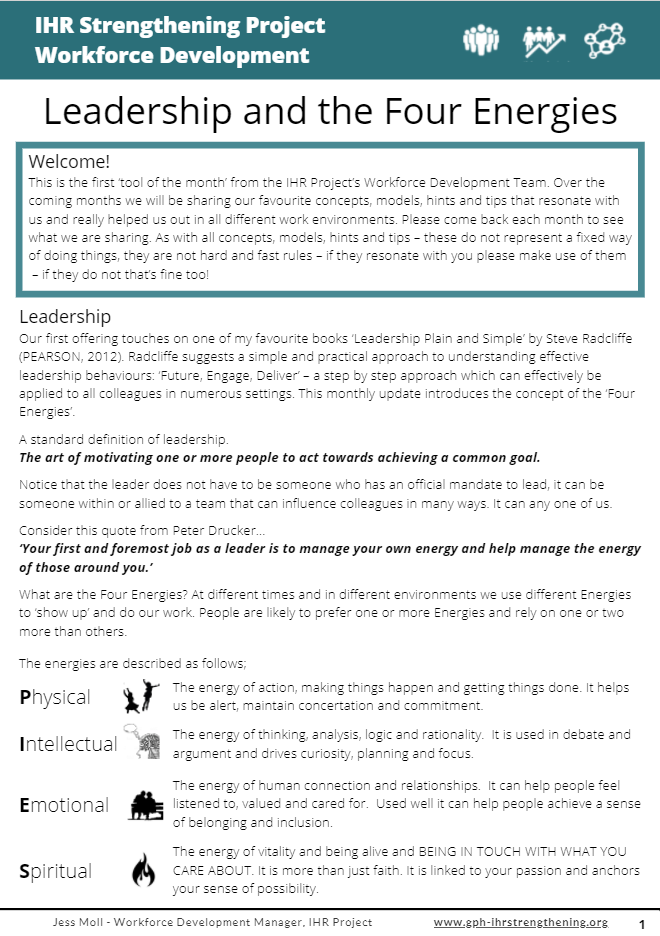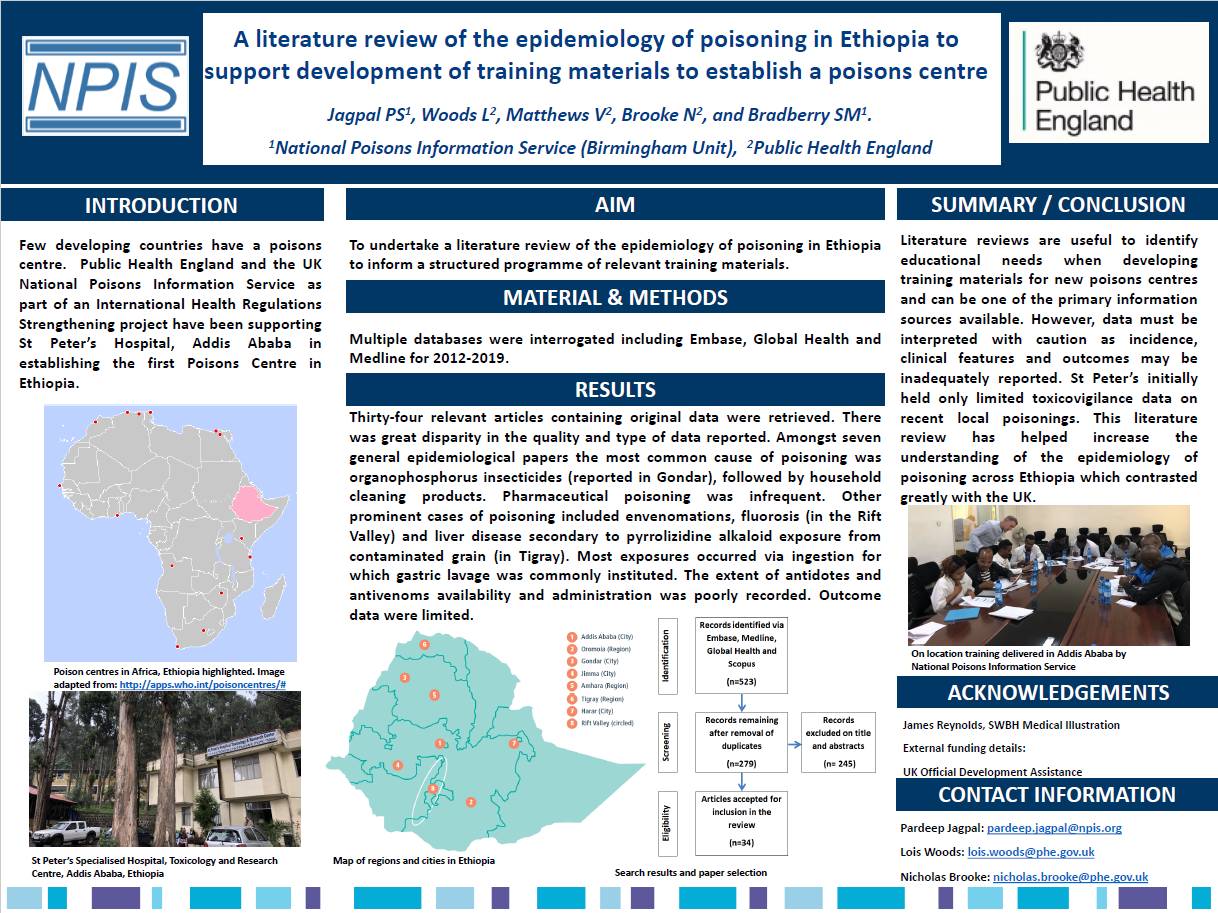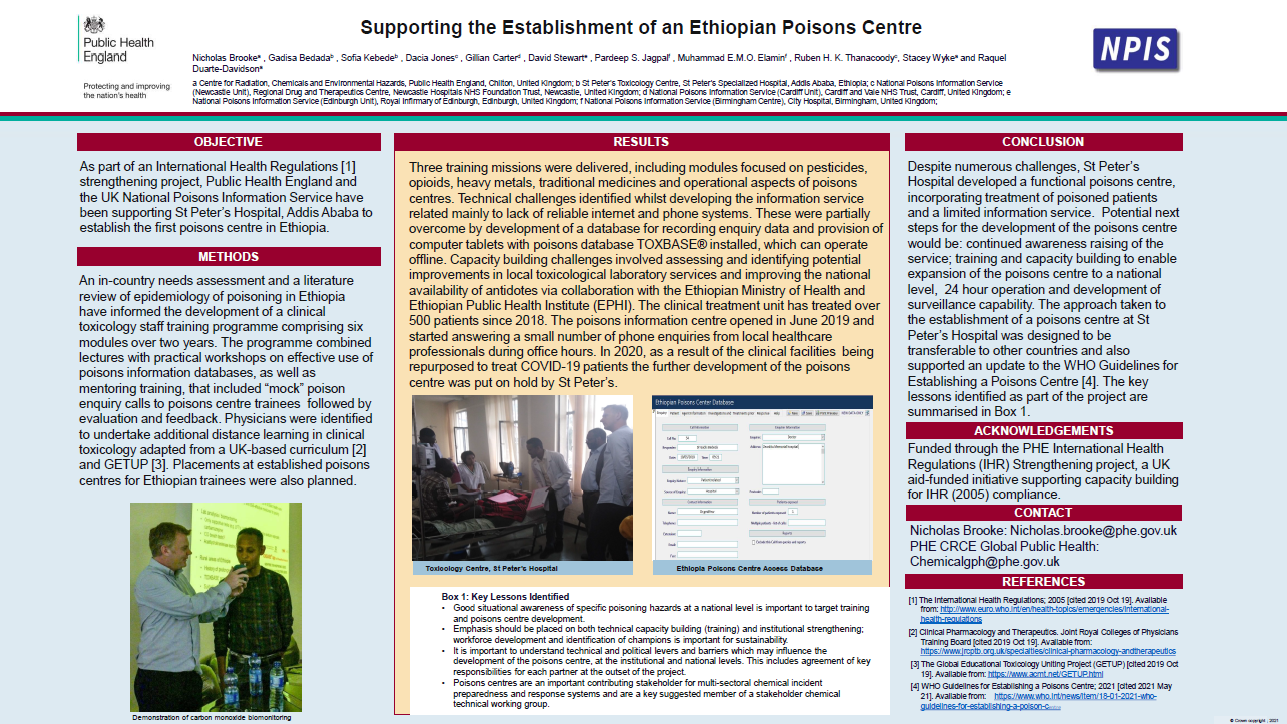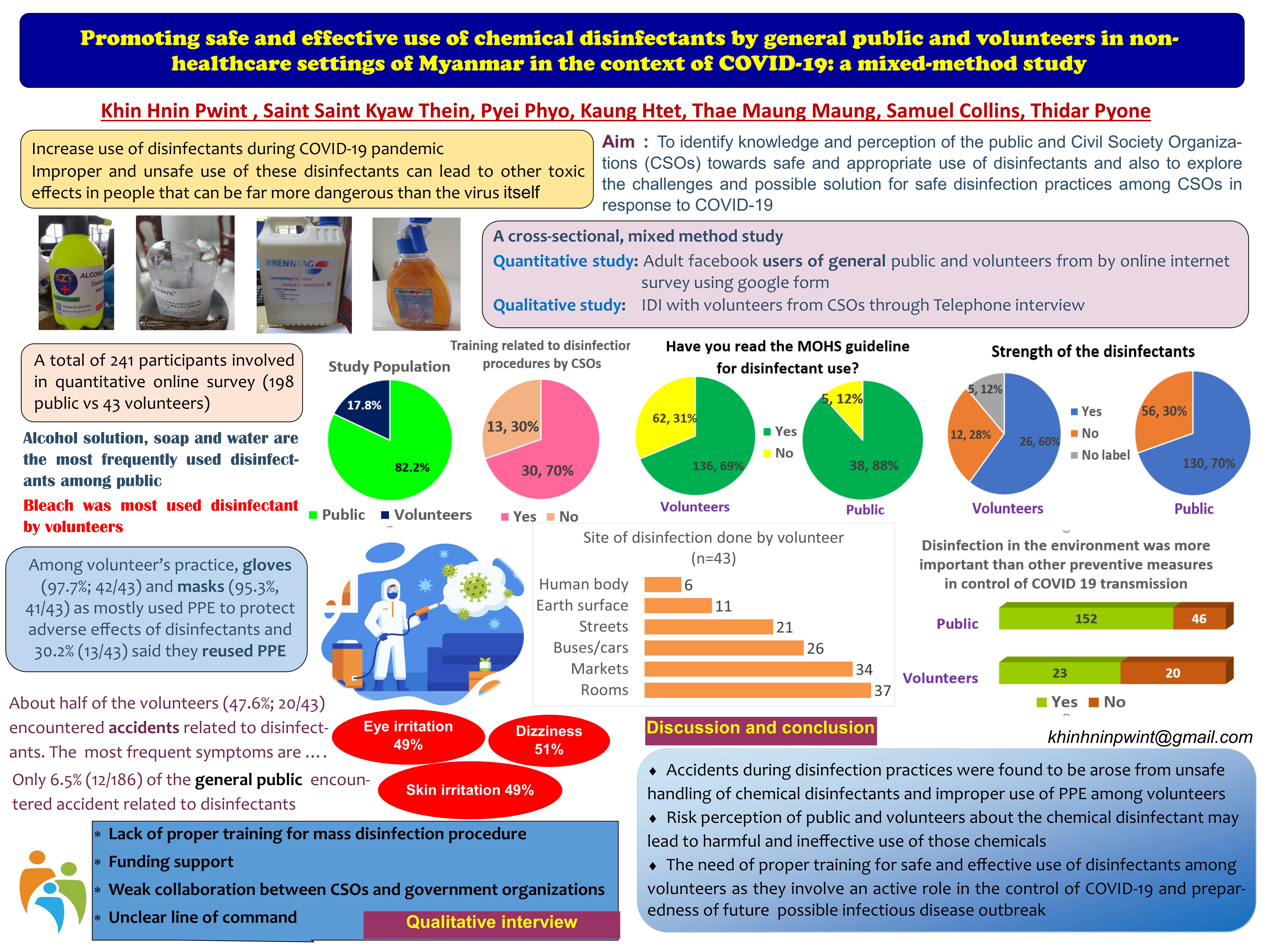
Many of the IHR-SP's activities have led to co-authored publications across different public health research disciplines. A selection of our most recent publications can be found below or see all our research publications here.
The IHR Strengthening Project is funded by UK Aid from the Department of Health and Social Care and run by UK Health Security Agency. The views expressed in these publications are those of the author(s) and not necessarily those of the Department of Health and Social Care.
The role of international support programmes in global health security capacity building: A scoping review
|
The Lancet Series on One Health and Global Health SecurityUKHSA | January 2023 Following the 2014-2016 Ebola outbreak in West Africa, and the on-going global COVID-19 pandemic, the One Health approach (bridging the Animal-Environmental-Human Health interface) has rapidly gained political and financial support, particularly in regional and transcontinental initiatives to improve Global Health Security, including through recently established institutions like Africa CDC and other multidisciplinary consortia. This four-paper Lancet Series explores the adoption of One Health approaches to improve health security and include an analysis of the current landscape of preventive, surveillance, and response measures in outbreak situations of emerging and re-emerging zoonotic infectious diseases with epidemic potential as well as other potential public health emergencies such as neglected endemic diseases, antimicrobial resistance, environmental and chemical hazards and natural disasters. The series has significant contributions from UKHSA staff including members of our IHR Strengthening Project and Global Operations team |
Monkeypox Risk and Mortality Associated with HIV Infection: A National Case Control Study in Nigeria
|
Telling our own story in global health–experience from NigeriaNigeria Centre for Disease Control | July 2022 An enlightening paper from the current and former Director Generals of the Nigeria Centre of Disease Control. The paper outlines the successful journey NCDC has taken to ensuring high quality data and outputs are published in international peer-reviewed journals and accessible for others to learn from. The paper specifically highlights the contribution of the IHR Strengthening Project to Nigeria being able to tell it’s own story in global health |
Comment on Carson et al: Strengthening global health security – lessons learned from Public Health England’s International Health Regulations strengthening projectUK Health Security Agency | May 2022 Response to the Itad evaluation of the Department of Health and Social Care’s (DHSC) Public Health England (PHE) International Health Regulations (IHR) Strengthening project. |
Strengthening global health security – lessons learned from public health England’s international health regulations strengthening projectITAD | Febuary 2022 The UK government has invested in health security capacity development through various projects and agencies, including the UK Department of Health and Social Care, whose Global Health Security Programme provides funding to Public Health England (PHE) to implement health security support. This article describes the results and conclusions of the midterm evaluation, undertaken by Itad, of one of Public Health England’s global health projects: International Health Regulations Strengthening, which operates across six countries and works with the Africa Centres for Disease Control. It also highlights some of the key lessons learned for the benefit of other agencies moving into supporting national health security efforts. |
Workforce Development Tool of the Month March 2022 - Resilience for Leaders
This is the tenth ‘tool of the month’ from the IHR Project’s Workforce Development Team. We are sharing our favourite concepts, models, hints, and tips that resonate with us and really helped us out in different work environments. Please come back each month to see what we are sharing. As with any concepts, models, hints and tips – these do not represent a fixed way of doing things, they are not hard and fast rules – if they resonate with you please make use of them – if they don’t that’s fine too!
|
Workforce Development Tool of the Month February 2022 - Moments of Truth |
Workforce Development Tool of the Month January 2022 - Light and Shadow of a Leader |
Reviewing Health Security Capacities in Nigeria Using the Updated WHO Joint External Evaluation and WHO Benchmarks Tool: Experience from a Country-Led Self-Assessment ExerciseNigeria Centre for Disease Control | Peer reviewed publication Across the world, the level of pandemic preparedness varies and no country is fully prepared to respond to all public health events. The International Health Regulations 2005 require state parties to develop core capacities to prevent, detect, and respond to public health events of international concern. In addition to annual self-assessment, these capacities are peer reviewed once every 5 years through the voluntary Joint External Evaluation (JEE). In this article, we share Nigeria's experience of conducting a country-led midterm self-assessment using a slightly modified application of the second edition of the World Health Organization (WHO) JEE and the new WHO benchmarks tool. |
|
|
The One Health approach to incident management of the 2019 Lassa fever outbreak response in Nigeria |
Epidemiological comparison of the first and second waves of the COVID-19 pandemic in Nigeria, February 2020–April 2021 |
Building local capacity for emergency coordination: establishment of subnational Public Health Emergency Operations Centres in Nigeria |
Workforce Development Tool of the Month - October 2021Personality
|
Workforce Development Tool of the Month - September 2021 |
Workforce Development Tool of the Month - August 2021 |
IHR Strengthening Project Annual Review 2019-2020Department of Health and Social Care, Public Health England | Annual Review This annual review covers the period of April 2019 - March 2020. The IHR Strengthening project team and Department of Health and Social Care Global Health Security (DHSC GHS) both provided input for this review. The IHR Strengthening project team provided the content and accumulated the inputs from across it's project teams, delivery teams and the target theatres of engagement. The DHSC GHS team provided written responses to the content provided, by outlining their assessment observations in green text boxes, at the key intersections of the review. |
Workforce Development Tool of the Month - July 2021 |
Epidemiological Comparison of the First and Second Waves of the COVID-19 Pandemic in Nigeria, February 2020-April 2021 |
Evaluating implementation of International Health Regulations core capacities: using the Electronic States Parties Self-Assessment Annual Reporting Tool (e-SPAR) to monitor progress with Joint External Evaluation indicatorsPublic Health England | Peer reviewed publication As part of the PHE IHR Strengthening Projects remit to build the evidence base for effective health systems strengthening, this paper investigates how SPAR and JEE indicators correlate to inform progress on IHR compliance and explores gaps in coverage. The authors mapped JEE indicators to SPAR indicators and found a high level of correlation suggesting the SPAR process offers a method for countries and technical assistance programmes to monitor progress and identify gaps in between JEE visits. The ongoing IHR Monitoring and Evaluation Framework review process offers an opportunity to enhance alignment and the authors suggest opportunities for this. |
Workforce Development Tool of the Month - June 2021 |
G7 Carbis Bay progress report: advancing universal health coverage and global health through strengthening health systems, preparedness and resilienceDepartment of Health and Social Care, Foreign, Commonwealth & Development Office, Public Health England | Government progress report This report sets out how G7 countries led on improving global health and tackling epidemics and emerging threats since 2015, including in the COVID-19 pandemic. Colleagues from the IHR Strengthening Project contributed to the report and evidence from the project appears in chapter 3, highlighting the UK's support for WHO Joint External Evaluation (JEE) processes and their use in strengthening IHR capacities. |
A literature review of the epidemiology of poisoning in Ethiopia to support development of training materials to establish a poisons centre
Public Health England | Conference poster A literature review of the epidemiology of poisoning in Ethiopia was undertaken to inform a structured programme of training materials for the new poison centre at St Peter’s Hospital, Addis Ababa. This poster exploring the process was developed under the IHR Strengthening Project and submitted to the 2020 Public Health England annual conference. |
Supporting the establishment of an Ethiopian Poisons Centre |
Promoting safe and effective use of chemical disinfectants by general public and volunteers in non-healthcare settings of Myanmar in the context of COVID-19: a mixed-method study
Myanmar Ministry of Health and Sports, Public Health England | Conference poster This study assesses the knowledge and perception of the public and Civil Society Organizations in Myanmar towards safe and appropriate use of disinfectants. The study explores the challenges and possible solutions for safe disinfection practices in response to COVID-19. The authors highlight the need for proper training in safe and effective use of disinfectants among volunteers involved in the control of COVID-19 and preparedness for future infectious disease outbreaks. |
Systematic Review of Human Poisoning and Toxic Exposures in Myanmar
|
Evaluation of National Event-Based Surveillance, Nigeria, 2016–2018
|
Evaluating an Institutional health Partnership using the ESTHER EFFECt tool: A Case Study of an Evaluation of the Institutional Health Partnership Between Nigeria CDC and Public Health EnglandNigeria Centre for Disease Control, Public Health England | Peer-reviewed publication This paper uses the ESTHER EFFECT tool to understand the strength, value and impact of the partnership between Nigeria Centre for Disease Control and Public Health England through the IHR Strengthening Project. Key strengths and weaknesses of the partnership were identified such as having wide ranging institutional engagement, however needing to improve dissemination mechanisms following key learning activity. The paper hopes to encourage similar evaluations to build and strengthen the evidence base around effective institutional health partnerships. |
Improving National Intelligence for Public Health Preparedness: a methodological approach to finding local multi-sector indicators for health securityEthiopia Public Health Institute, Nigeria Centre for Disease Control, Pakistan National Institute of Health, Public Health England | Peer-reviewed publication The authors of this paper designed and piloted a rapid framework review and Delphi consultative process in collaboration with three National Public Health Institutes (NPHIs) in Ethiopia, Nigeria and Pakistan to identify, assess and prioritise non-traditional subnational indicators to improve preparedness monitoring. |
Nigeria’s public health response to the COVID-19 pandemic: January to May 2020Africa Centres for Disease Control and Prevention, Nigeria Centre for Disease Control, Public Health England, WHO Regional Office for Africa | Peer-reviewed publication This paper reports on the emergence of COVID-19 in Nigeria and the public health response up until May 2020. |
Health system governance in strengthening International Health Regulations (IHR) compliance in MyanmarMyanmar Ministry of Health and Sports, Public Health England | Peer-reviewed publication This paper highlights the importance of the relationship between governance and International Health Regulations (IHR) in the context of Sustainable Development Goals. Myanmar IHR strengthening efforts can further be improved by promoting an environment which is conducive for better health system governance. |
Thinking differently: lessons learned by international public health specialists while supporting strengthening of the Integrated Disease Surveillance and Response system in PakistanPublic Health England | Peer-reviewed publication This paper reflects on the learning of IHR Project colleagues, Dr Anne Wilson and Chris Cartwright, in their efforts to support the Pakistan government to improve compliance with the International Health Regulations, specifically through strengthening its Integrated Disease Surveillance and Response system. |
Using critical information to strengthen pandemic preparedness: the role of national public health agencies
Nigeria Centre for Disease Control, Pakistan National Institute of Health, Public Health England | Peer-reviewed publication This work is based on collaboration with Nigeria, Ethiopia and Pakistan National Public Health Institutes (NPHIs) – it also involved close collaboration with other European NPHIs as well as IANPHI. The work demonstrates a key part of the IHR Project's strategy, which aims to galvanise the collective capacity of the IANPHI network of NPHIs in support of institutional capacity building. |
Descriptive epidemiology of coronavirus disease 2019 in Nigeria, 27 February– 6 June 2020Nigeria Centre for Disease Control, Public Health England | Peer-reviewed publication The authors of this study analysed a national surveillance dataset of COVID-19 testing collected in Nigeria between 27 February and 6 June 2020. The authors provide an insight into the early epidemiology of COVID-19 in Nigeria to enhance planning and response strategies. |
Exportation of Monkeypox virus from the African Continent
Nigeria Centre for Disease Control, Public Health England, WHO Regional Office for Africa | Peer-reviewed publication The authors of this study analyse epidemiological and molecular data for Monkeypox cases exported to the UK, Israel and Singapore in September 2017, and Nigerian cases of Monkeypox to better understand the exportations in the temporal and geographic context of the outbreak. |
The Global Health Security Index: what value does it add?Public Health England | Peer-reviewed publication This article critically reviews whether the Global Health Security Index adds value to the existing suite of tools for improved global health security. The authors discuss the indicators and their validity, the scoring system and its weighting, and whether the scoring should be used to determine country priorities. |
Clinical Course and Outcome of Human Monkeypox in NigeriaNigeria Centre for Disease Control, Public Health England | Peer-reviewed publication This study undertakes a retrospective review of records of 40 human monkeypox cases from Nigeria and describes the clinical course, management, and outcome of patients. The study reports the majority of cases developed fever and self-limiting vesiculopustular skin eruptions. Five deaths were reported. Compared to human immunodeficiency virus (HIV)–negative cases, HIV type 1–coinfected cases had more prolonged illness, larger lesions, and higher rates of both secondary bacterial skin infections and genital ulcers. |
Building the case for embedding global health security into universal health coverage: a proposal for a unified health system that includes public health
Public Health England | Peer-reviewed publication This article examines areas of overlap between public health functions and health-care services in strengthening health systems. The authors offer recommendations for construction of a unified national health system that includes public health. |
A partnership approach to strengthening IHR compliancePublic Health England | Peer-reviewed publication IHR Project colleagues and the Director General of NCDC respond to Joint external evaluation of the International Health Regulation (2005) capacities: current status and lessons learnt in the WHO African region. The authors discuss the approach of the IHR Strengthening Project, the joint external evaluation process and value of the collaboration between national public health institutions to strengthen global health security. |
Outbreak of human monkeypox in Nigeria in 2017–18: a clinical and epidemiological report
Nigeria Centre for Disease Control, Public Health England, WHO Regional Office for Africa | Peer-reviewed publication This study provides detailed clinical and epidemiological data for the 2017–18 outbreak of monkeypox virus infection in Nigeria, which is the largest known outbreak of the west African clade of monkeypox virus to date. |
Lessons from Public Health England's Workforce Development Project in Sierra LeonePublic Health England | IANPHI Newsletter In this article, workforce development colleagues report on their collaboration with the Sierra Leone Ministry of Health and Sanitation to establish a national public health institute. The authors outline the tools and approach employed and reflect on their learning. |
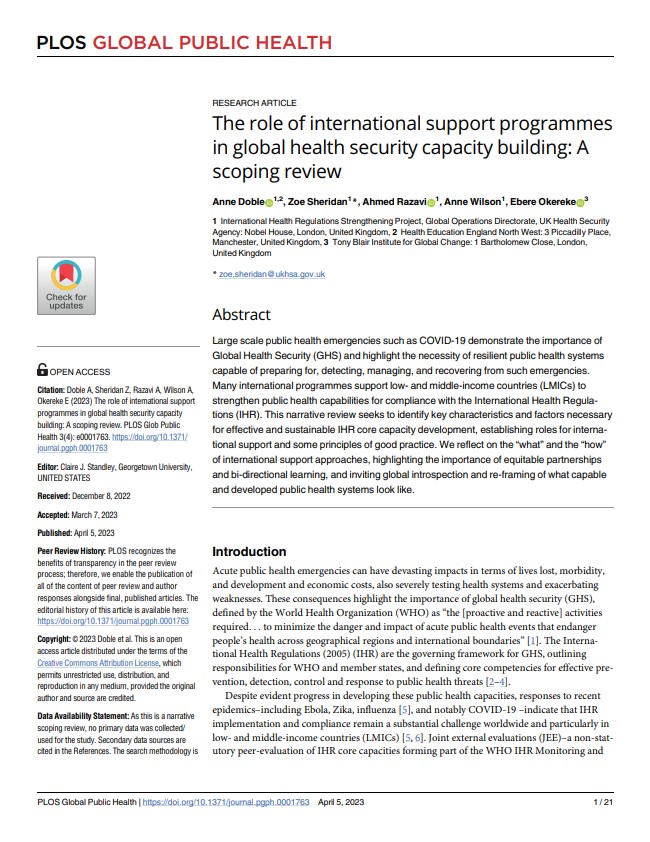
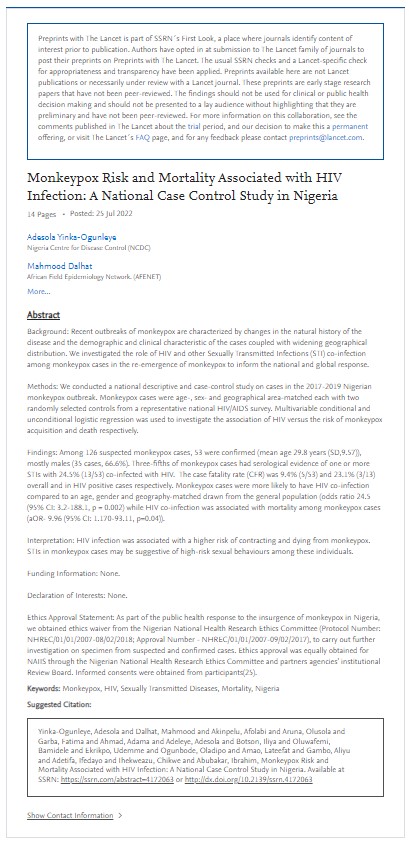
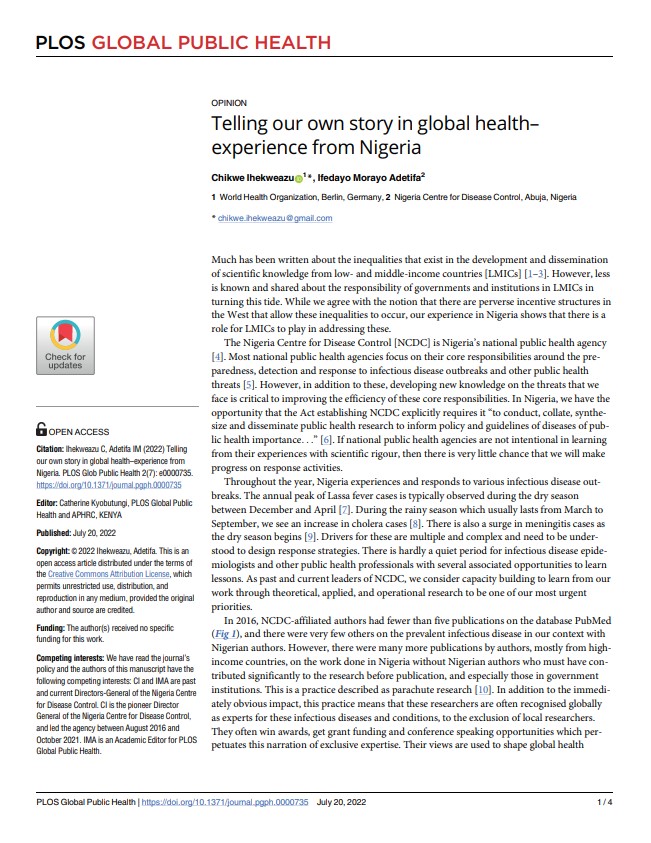
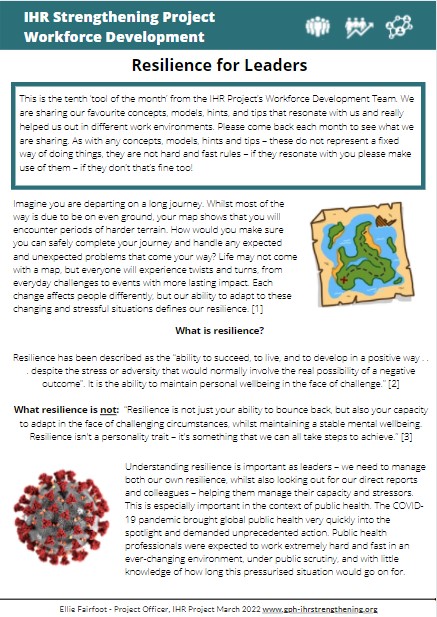 UK Health Security Agency
UK Health Security Agency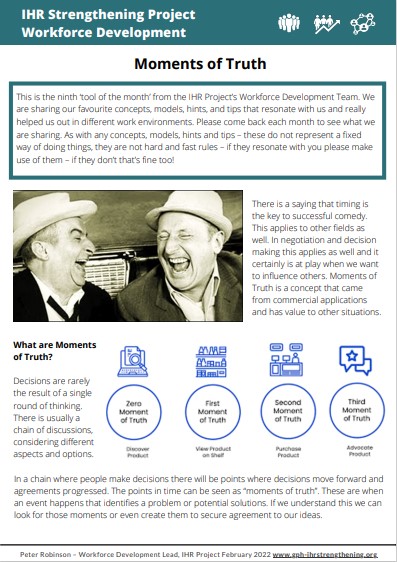
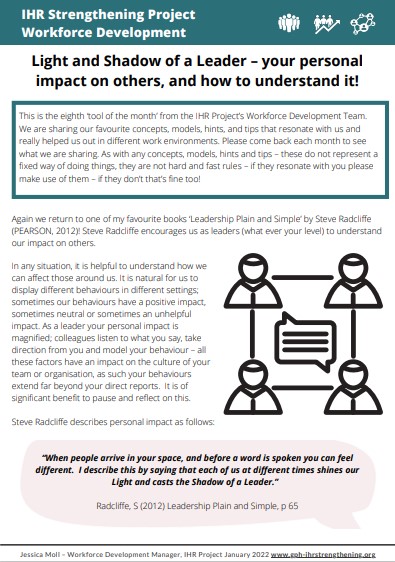
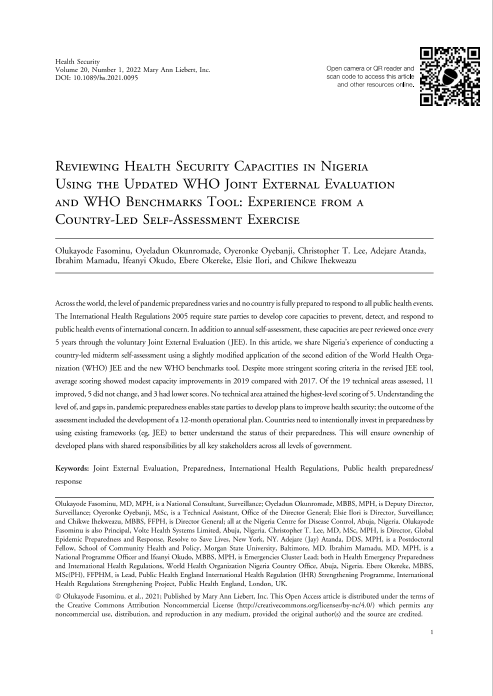
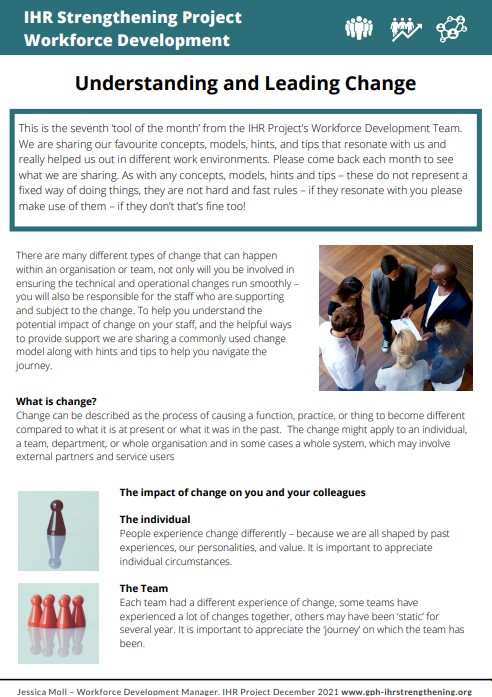 Workforce Development Tool of the Month - December 2021 | Understanding and Leading Change
Workforce Development Tool of the Month - December 2021 | Understanding and Leading Change 